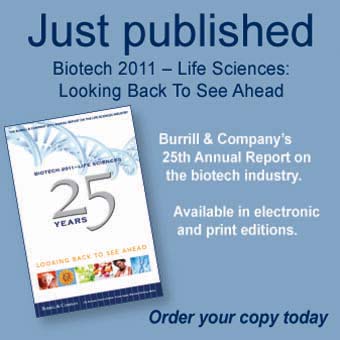CardioDx makes a non-invasive, blood-based genetic test that measures a person’s risk of developing cardiovascular disease. The Palo Alto, California-based company raised $57.5 million in a $78.3 million series E round of equity and options, according to a recent regulatory filing. Although the 17 investors in the new round were not named, a report in Dow Jones VentureWire listed new investor Longitude Capital as the lead investor.
Previous investors include Kleiner, Perkins, Caufield & Byers, TPG Biotech, Mohr Davidow Ventures, Intel Capital, Pappas Ventures, DAG Ventures, Asset Management Company and GE Capital. Last year, in conjunction with its equity investment, GE Healthcare formed an alliance with the firm to co-develop cardiovascular diagnostics.
The beauty of CardioDx’ test for predicting cardiovascular risk, says the company, is that it is non-invasive and accurate. Current standards for diagnosing risk, including catheter-based angiography and non-invasive methods that expose the patient to radiation and contrast agents, carry the chance of misdiagnosis.
In October, CardioDx published results from a multi-center trial that validated its blood-based gene expression test to assess the presence of obstructive coronary artery disease.
“The critical question that we addressed—can the gene expression from white blood cells provide information about blockages of the coronary arteries?—was answered and validated in a select cohort who also underwent angiography,” says Eric Topol, Director of the Scripps Translational Science Institute in La Jolla, California, the principal investigator for the trial. “The findings may help our future ability to direct coronary angiography to the patients with real clinical need.”
North Carolina biotech Aerie Pharmaceuticals closed a $30 million series B financing co-led by Clarus Ventures and Sofinnova Ventures, with participation from Osage University Partners, and existing investors Alta Partners and TPB Biotech. Aerie’s focus is ophthalmology. The company expects to use proceeds from this financing to fund continued development of its portfolio in glaucoma and advance its lead product, AR-12286, a first-in-class selective Rho-kinase inhibitor that is designed to lower intraocular pressure, into late-stage trials by the end of 2011. Glaucoma is the second leading cause of visual disability and blindness in the world today.
NovaShunt, a private Swiss medical device company with innovative fluid management technologies, raised $25 million in a series B preferred share financing round co-led by BioMedInvest, Entrepreneurs Fund, and Capricorn Health-tech Fund, with participation by existing investors NeoMed and VI Partners. NeoMed remains the lead investor in NovaShunt.
NovaShunt’s device is an implantable pump system that continually removes excess abdominal fluid, known as ascites, in patients suffering from liver cirrhosis, certain cancers, and congestive heart failure. Refractory ascites occurs when patients with excess ascites no longer respond to medical therapy. It affects more than 100,000 patients in Europe and the United States every year, a number that is growing due to the accelerating incidence of hepatitis and obesity-related liver disease.
The biggest deal of the week continued the trend of acquisitions by Japanese companies taking advantage of a strong yen to acquire outside innovation. This time it was Japan’s largest medical device company, Terumo, announcing that it was acquiring CaridianBCT, a Colorado-based global maker of blood transfusion products, for $2.63 billion including debt.
The acquisition expands Terumo’s dominance in the blood transfusion market to number one from its current global rank at five. Terumo believes there will be a rising global demand for blood transfusion products due to the aging of the population and the rapid development of healthcare infrastructure in emerging countries.
The acquisition of CaridianBCT provides complementary business lines and access to the North American market. CaridianBCT is a unit of global medical technology company Gambro.
Japanese pharma Eisai was also busy, striking a strategic partnership deal with Massachusetts biotech Epizyme to discover, develop, and commercialize therapeutics targeting EZH2, an epigenetic enzyme, for the treatment of lymphoma and other cancers in genetically defined populations.
Epizyme will get $6 million in upfront and initial milestones, and may earn more than $200 million more in milestones, plus royalties. Eisai will fund all costs through human proof-of-concept, at which point Epizyme has the right to opt into a profit share and co-commercialization arrangement for the United States. The deal comes soon after Epizyme entered into a global alliance with GlaxoSmithKline worth potentially $650 million to discover, develop, and market novel small molecule therapeutics targeting histone methyltransferases, a class of epigenetic enzymes, for the treatment of cancer and other diseases.
DEALS FOR THE WEEK ENDING MARCH 11, 2011
| Global Venture Financings | |||
| Company | Location | Amount Raised (USD M) | Principal Activity |
| CardioDx | Palo Alto, CA | 57.5 | Diagnostics |
| Aerie Pharmaceuticals | Research Triangle, NC | 30.0 | Ophthalmology |
| Kite Pharma | Los Angeles, CA | 15.0 | Immunotherapy |
| Veniti | St Louis, MO | 13.5 | Medical devices |
| Astute Medical | San Diego, CA | 13.0 | Diagnostics |
| Samplify Systems | Santa Clara, CA | 11.2 | Tools/Technology |
| Liquidia Technologies | Research Triangle, NC | 10.0 | Vaccines |
| BridgePoint Medical | Minneapolis, MN | 9.1 | Medical devices |
| Euthymics Bioscience | Cambridge, MA | 4.0 | Neurology |
| Device Innovation Group | Nashville, TN | 4.0 | Medical devices |
| Image Stream Medical | Littleton, MA | 2.0 | Imaging technology |
| Stonewedge | Andover, MA | 1.0 | Digital Health |
| Sapphire Energy | San Diego, CA | N/A | Industrial/Ag |
| Nimbus Discovery | Cambridge, MA | N/A | Tools/Technology |
| NovaShunt | Switzerland | 25.0 | Medical devices |
| BerGenBio | Bergen, Norway | 1.2 | Genomics |
| Stimatix GI | Misgav, Israel | 1.0 | Medical devices |
| Total Raised US | 170.3 | ||
| Total Raised Non-US | 27.2 | ||
| Grants | |||
| Company | Funding Agency | Amount Raised (USD M) | Principal Activity |
| Arcadia Biosciences | National Institutes of Health | 1.0 | Crop traits in wheat |
| Amsterdam Molecular Therapeutics | Duchenne Parent Project | 0.2 | Muscular dystrophy |
| Avaxia Biologics | NIH NIDDK Phase 1 SBIR | 0.1 | Celiac disease |
| Total Grants | 1.3 | ||
| Public Financings | |||
| Company | Ticker | Amount Raised (USD M) |
Financing Type |
| Allliqua | OTC:ALQA | 1.0 | PIPE |
| Nephros | NEPH | 3.2 | PIPE |
| Biomagnetics Diagnostics | BMGP:Pk | 0.3 | PIPE |
| Oramed Pharmaceuticals (Israel) | OTC:ORMP | 3.2 | PIPE |
| Exelixis | EXEL | 165.0 | Follow on |
| Catalyst Pharmaceutical Partners | CPRX | 2.2 | Follow on |
| Warner Chilcott (Ireland) | WCRX | 581.3 | Follow on |
| BioDelivery Sciences | BDSI | 15.0 | Follow on |
| WebMD | WBMD | 350.0 | Debt |
| UCB (Belgium) | EBR:UCB | 419.7 | Debt |
| Biocryst Pharmaceuticals | BCRX | 30.0 | Royalty stream monetarization |
| Total Public Financings-US | 566.7 | ||
| Total Public Financings-Non-US | 1004.2 | ||
| M&A | |||
| Acquirer | Target | Deal Value (USD M) |
Focus |
| Terumo (Japan) | CaridianBCT | 2,600.0 | Medical devices |
| Accuray | TomoTherapy | 277.0 | Radiation oncology |
| Halma (United Kingdom) | Medicel (Switzerland) | 107.6 | Medical devices |
| Royal Philips Electronics (Netherlands) | Dameca (Denmark) | N/A | Medical devices |
| Alliances | |||
| Company/Licenser | Company/Licensee | Deal Value (USD M) |
Focus |
| Epizyme | Eisai (Japan) | 206.0 | Cancer drug discovery partnership |
| Aeterna Zentaris (Canada) | Yakult Honsha (Japan) | 69.2 | Cancer drug license |
| Ziopharm Oncology | Solasia K.K. (Japan) | N/A | Cancer drug license |
| Evolva (Switzerland) | BASF (Germany) | N/A | Agbio collaboration |
| AstraZeneca (United Kingdom) | Galderma Pharma (France) | N/A | Dermatology collaboration |
| RaQualia Pharma (Japan) | Aratana Therapeutics | N/A | Animal health license |
| WuXi PharmaTech (China) | Bristol-Myers Squibb | N/A | CRO collaboration |
| HUYA Bioscience (China) | Wuhan National Bio-Industry Base (China) | N/A | Drug development alliance |
| Oxford Medical Diagnostics (United Kingdom) | V&F Analyse- und Messtechnik (Austria) | N/A | Mass Spectrometry alliance |
| RainDance Technologies | Ambry Genetics | N/A | ADME analysis collaboration |
| RainDance Technologies | Roche (Switzerland) | N/A | Next-gen sequencing collaboration |
| Fenwal | Golden Meditech (China) | N/A | Technology joint venture |
| Sapphire Energy | Monsanto | N/A | Agbio collaboration |
| Solazyme | Dow Chemical | N/A | Renewable chemicals alliance |
| Public/Private Partnerships | |||
| Company | Institution | Deal Value (USD M) |
Focus |
| Anacor Pharmaceuticals | Institute for OneWorld Health | N/A | Infectious disease |
| Fibrocell Science | UCLA | N/A | Cell therapy |
| Phylogica (Australia) | University of Cambridge (UK) | N/A | Drug discovery |
| Covance | Institute for Systems Biology | N/A | Central nervous system disorders |
| Evotec (Germany) | Harvard University and Howard Hughes Medical Institute | N/A | Diabetes treatments |
March 11, 2011
http://www.burrillreport.com/article-a_finger_prick_test_to_measure_cardiovascular_risk.html





.gif)
